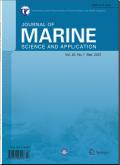Scale Effect of a Kappel Tip-Rake Propeller
IF 2.1
4区 工程技术
Q2 ENGINEERING, MARINE
引用次数: 0
Abstract
Abstract In this paper, the scale effect of Kappel tip-rake propellers with different end plate designs was studied using computational fluid dynamics. Given the base size of the mesh and the appropriate numerical model for the determined simulation, the open-water performance of three Kappel propellers with different bending degrees of the end plate at different scales was calculated. Comparing the scale effect of these propellers, the scale effect of the torque coefficient of a Kappel propeller is more intense than that of the conventional propeller. In addition, the scale effect of the torque coefficient is strong when the bending degree of the end plate increases, dwarfing the scale effect on the thrust coefficient. Following the research on the scale effect of the wake field for the Kappel propeller, the laws that reveal the influence of the scale on the wake field were summarized; that is, the high-speed zone in the wake relatively expands with the increase of the scale in company with a trend of tip cross flow. The research reveals the basic variation trend and rule of the open-water performance and wake distribution for the Kappel propeller under different scales within the Reynolds number range of 4.665×10 5 −8.666×10 7 considering γ transition, as well as the characteristic differences between the Kappel propellers with different end plate designs, which will be of great significance to its optimization design and application to marine vehicles of different scales.Kappel前倾螺旋桨的尺度效应
摘要采用计算流体力学方法,研究了不同端板设计的Kappel前倾螺旋桨的尺度效应。给定网格的基本尺寸和所确定的模拟的合适的数值模型,计算了三种不同端板弯曲度的Kappel螺旋桨在不同尺度下的开放水域性能。对比这些螺旋桨的尺度效应,卡佩尔螺旋桨的扭矩系数的尺度效应比常规螺旋桨更强烈。此外,端板弯曲程度越大,扭矩系数的尺度效应越强,而推力系数的尺度效应较小。通过对卡佩尔螺旋桨尾流场尺度效应的研究,总结了尺度对尾流场影响的规律;即随着规模的增大,尾迹中的高速区相对扩大,并呈叶尖横流的趋势。研究揭示了在4.665×10 5−8.666×10 7雷诺数范围内考虑γ跃迁的不同尺度下Kappel螺旋桨开放水域性能和尾流分布的基本变化趋势和规律,以及不同端板设计的Kappel螺旋桨的特性差异,对其在不同尺度船舶上的优化设计和应用具有重要意义。
本文章由计算机程序翻译,如有差异,请以英文原文为准。
求助全文
约1分钟内获得全文
求助全文
来源期刊

Journal of Marine Science and Application
ENGINEERING, MARINE-
CiteScore
3.60
自引率
5.60%
发文量
53
期刊介绍:
The aim of the Journal of Marine Science and Application (JMSA) is to provide a platform for current issues in a range of topics relevant to marine science and engineering, and to guide engineering application for scientists and engineers.
JMSA is a scholarly international journal, publishing high-level peer-reviewed research on the subjects in the field of theoretical and experimental investigations, that explore naval architecture, ocean engineering, marine renewable energy, underwater technology, marine engineering, corrosion prevention, ocean acoustics, automatic navigation among others. Topics include, but are not limited to:
Naval architecture
Marine hydrodynamics
Structural mechanics
Design methodology & practice
Ship resistance and propulsion
Safety and reliability
Marine equipment technology
Ocean engineering
Coastal engineering
Offshore engineering
Marine drilling
Pipelines and risers
Cable, mooring, buoy technology
Marine renewable energy
Offshore wind energy utilization
Ocean wave energy utilization
Ocean current energy utilization
Underwater technology
Underwater vehicles
Underwater explosion
Ocean resources & mining
Marine sensors
Marine engineering
Marine engines and fuels
Marine power engineering
Vibration and noise control
Heat transfer and fluid flow
Ocean acoustics
Sonar and transducers
Sound propagation and scattering
Acoustical oceanography
Signal coherence and fluctuation
Polar and arctic engineering
Design of ice-going ships
Arctic structures
Ice loads and simulation of ice
Marine environmental engineering
Oil spill prevention
Maine pollution modeling
Marine corrosion and protection
Corrosion and deterioration modeling
Ship corrosion protection
Pipeline corrosion protection
Automatic navigation
Ship navigation system
Marine navigation equipment
System dynamics & control
Marine science
Marine meteorology
Ocean internal waves
Extreme offshore environments
Experimental technology of above
Engineering application of above
The journal welcomes submissions of papers around the world on all the above topics. It also receives original works in the other emerging and interdisciplinary areas of the oceans.
 求助内容:
求助内容: 应助结果提醒方式:
应助结果提醒方式:


